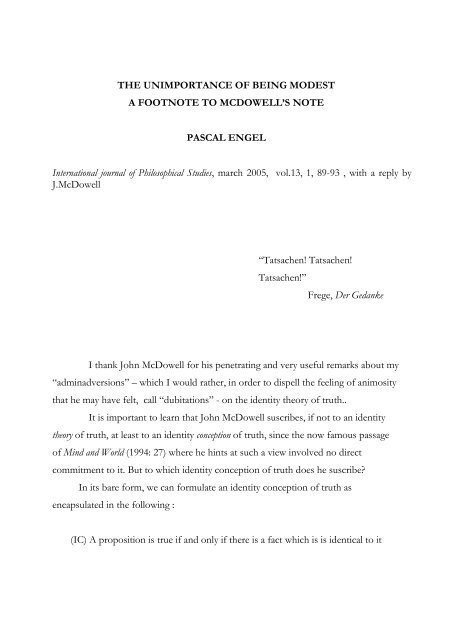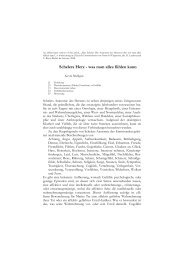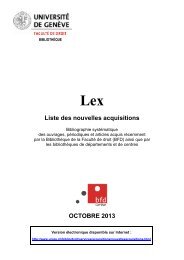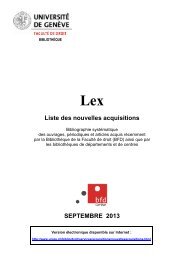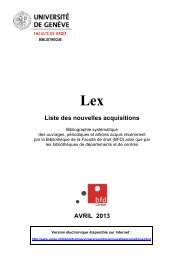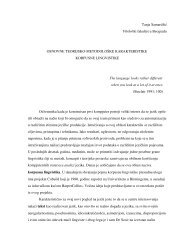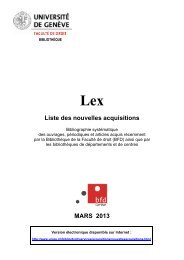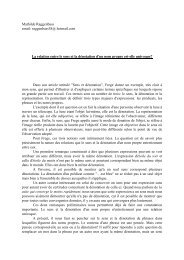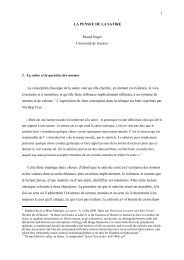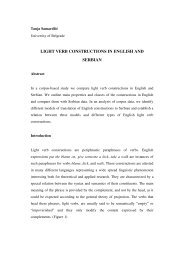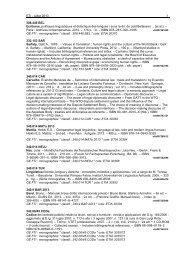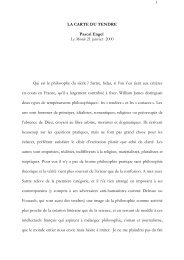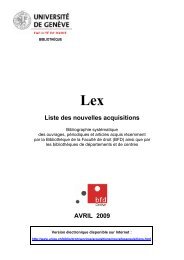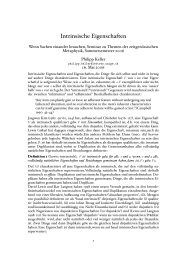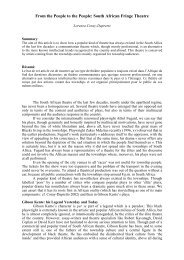2005 Unimportance of being modest A footnote to McDowel
2005 Unimportance of being modest A footnote to McDowel
2005 Unimportance of being modest A footnote to McDowel
Create successful ePaper yourself
Turn your PDF publications into a flip-book with our unique Google optimized e-Paper software.
THE UNIMPORTANCE OF BEING MODEST<br />
A FOOTNOTE TO MCDOWELL’S NOTE<br />
PASCAL ENGEL<br />
International journal <strong>of</strong> Philosophical Studies, march <strong>2005</strong>, vol.13, 1, 89-93 , with a reply by<br />
J.<strong>McDowel</strong>l<br />
“Tatsachen! Tatsachen!<br />
Tatsachen!”<br />
Frege, Der Gedanke<br />
I thank John <strong>McDowel</strong>l for his penetrating and very useful remarks about my<br />
“adminadversions” – which I would rather, in order <strong>to</strong> dispell the feeling <strong>of</strong> animosity<br />
that he may have felt, call “dubitations” - on the identity theory <strong>of</strong> truth..<br />
It is important <strong>to</strong> learn that John <strong>McDowel</strong>l suscribes, if not <strong>to</strong> an identity<br />
theory <strong>of</strong> truth, at least <strong>to</strong> an identity conception <strong>of</strong> truth, since the now famous passage<br />
<strong>of</strong> Mind and World (1994: 27) where he hints at such a view involved no direct<br />
commitment <strong>to</strong> it. But <strong>to</strong> which identity conception <strong>of</strong> truth does he suscribe?<br />
In its bare form, we can formulate an identity conception <strong>of</strong> truth as<br />
encapsulated in the following :<br />
(IC) A proposition is true if and only if there is a fact which is is identical <strong>to</strong> it
I agree with <strong>McDowel</strong>l that, formulated in this way, IC is a truism, which ill deserves<br />
the name <strong>of</strong> a “theory”. But the fact that a version <strong>of</strong> this view has been held by<br />
philosophers as different from each other as Bradley, Russell, and Moore (Cartwright<br />
1987, Candlish 1989, Baldwin 1991) makes us suspect that more metaphysical flesh<br />
has been put on these bare bones, depending on how one reads the equivalence IC: if<br />
one identifies true propositions with facts in the world one is lead <strong>to</strong> an extreme realist<br />
reading <strong>of</strong> IC, and if one identifies facts in the world <strong>to</strong> true thoughts or judgements<br />
one is lead <strong>to</strong> an extreme idealist reading 1 . Now, as Jennifer Hornsby (1997) as shown,<br />
<strong>to</strong> my mind convincingly, we can also attribute the IC <strong>to</strong> Frege under the following<br />
formulation (which is Frege’s in Der Gedanke):<br />
ICF<br />
A fact is a thought that is true<br />
<strong>McDowel</strong>l considers that it is nothing but a formulation <strong>of</strong> the truism IC. But he<br />
denies that either IC or ICF can be read, as I suggested in my article, from left <strong>to</strong> right<br />
or for right <strong>to</strong> left, i.e in a realist or in idealist sense. He suspects me <strong>of</strong> suscribing <strong>to</strong> a<br />
psychologist reading <strong>of</strong> Frege when I suppose that the idea that the world (the <strong>to</strong>tality<br />
<strong>of</strong> facts) is made up <strong>of</strong> Fregean thoughts can be read in an idealist sense (left <strong>to</strong> right),<br />
or in a realist sense (right <strong>to</strong> left). My mistake, according <strong>to</strong> him, is <strong>to</strong> forget that ICF<br />
can be read in both senses, and that neither one is privileged: if facts are true thoughts,<br />
true thoughts ( “thinkables”, as he prefers <strong>to</strong> call them) are facts, and reality is neither<br />
mind nor world.<br />
I certainly did not mean <strong>to</strong> interpret Frege’s notion <strong>of</strong> sense as something<br />
mental. I just wanted <strong>to</strong> point out that, once we formulate IC in terms <strong>of</strong> ICF, there is<br />
still room for an idealist reading, and that the identification <strong>of</strong> facts with true thoughts<br />
1 According <strong>to</strong> Künne (2003:
is not at all innocent. If, as <strong>McDowel</strong>l says “true thinkables already belong just as<br />
much <strong>to</strong> minds as <strong>to</strong> the world”, Frege’s reaction <strong>of</strong> bewilderment when Russell <strong>to</strong>ld<br />
him that the proposition (the thought) that Mont Blanc is more than 4000 meters<br />
high contains Mont Blanc itself with all its rocks and snows, would be difficult <strong>to</strong><br />
explain. Instead <strong>of</strong> denying that Mont Blanc itself belongs <strong>to</strong> the proposition or<br />
thought, Frege should have accepted this claim, and should have said <strong>to</strong> Russell: “Gut!<br />
if you want it that way, you are free <strong>to</strong> say that the mountain if part <strong>of</strong> the thought”.<br />
On <strong>McDowel</strong>l’s view, Moore must have been wrong when he said :<br />
[Suppose I have the true belief ]that a given tree, which I see, is an oak…The<br />
proposition that the tree is an oak is something which is and equally is whether the<br />
belief is true or false…But..the fact that the tree is an oak is something which is, only<br />
if the belief be true,and hence it is quite plain that…the fact that the tree is an oak is<br />
quite a different thing…from what I believe, when I believe that it is one..” (Moore<br />
1953: 308] 2<br />
There is, however, a third version <strong>of</strong> IC, which elaborates on the truism, and which I<br />
called, perhaps wrongly given the great variety <strong>of</strong> conceptions defended under that<br />
name, “minimalist”. Jennifer Hornsby (1997) has shown that one could extract from<br />
Frege’s remarks in De Gedanke a version <strong>of</strong> the identity theory : a fact is a true thought,<br />
where “thought” is taken as a Fregean sense. Let us call it the On this minimalist, or<br />
perhaps neutralist reading, IC is neutral or indifferent upon whether the equivalence is<br />
read from left <strong>to</strong> right. Hence there is no <strong>McDowel</strong>l<br />
2 Quoted by Künne 2003 : 9-10.
In my article (Engel 2001) I did not mean <strong>to</strong> ascribe <strong>to</strong> <strong>McDowel</strong>l a any direct<br />
commitment <strong>to</strong> an idealist version <strong>of</strong> IC,<br />
Ever since as the identity theory <strong>of</strong> truth made its reapparence on the philosophical<br />
scene it has been clear that there are at least three versions <strong>of</strong> it, depending : (a)<br />
“Realist”: the world consists <strong>of</strong> true propositions (Russell, Moore), (b) “idealist”(<br />
Bradley) : the world consists <strong>of</strong> true judgements, and (c) a version which I would now<br />
call “neutralist”: a true thought is a fact (Frege). On (c) there is no point<br />
3 .When John <strong>McDowel</strong>l seemed <strong>to</strong> suscribe <strong>to</strong> it in a now famous page <strong>of</strong> Mind and<br />
World (1994: 27),<br />
It is important <strong>to</strong> learn that John <strong>McDowel</strong>l suscribes <strong>to</strong> an identity conception <strong>of</strong><br />
truth, since his now famous remark on p.27 <strong>of</strong> the first edition <strong>of</strong> Mind and World, <strong>to</strong><br />
the effect that “there is no gap between thought as such and the world”,<br />
As soon as the identity theory <strong>of</strong> truth made its reapparence on the philosophical<br />
scene (Cartwright 1987, Baldwin 1991, Candlish 1989) it has been clear that there are<br />
at least two <strong>of</strong> it, idealist ( Bradley) and realist (Russell, Moore) 4 .When John <strong>McDowel</strong>l<br />
seemed <strong>to</strong> suscribe <strong>to</strong> it in a now famous page <strong>of</strong> Mind and World (1994: 27),<br />
3 See also the interesting discussion in Künne 2003: 6-12<br />
4 See also the interesting discussion in Künne 2003: 6-12
One <strong>of</strong> the reasons why I expressed scepticism about an identity theory <strong>of</strong> truth was<br />
that it seemed <strong>to</strong> me <strong>to</strong> oscillate between a substantive thesis affirming the identity <strong>of</strong><br />
thought and reality and a <strong>modest</strong> or minimalist thesis which I found quite close <strong>to</strong><br />
other, more well-known, versions <strong>of</strong> minimalism. Now I was well aware that<br />
<strong>McDowel</strong>l’s endorsement <strong>of</strong> an identity theory – or rather conception - <strong>of</strong> truth was<br />
meant <strong>to</strong> be <strong>of</strong> the <strong>modest</strong> or minimalist kind and not <strong>of</strong> the substantive kind which<br />
has been attributed <strong>to</strong> Bradley (on the idealist version <strong>of</strong> the substantive theory) or <strong>to</strong><br />
Russell and Moore (on the realist version). My reason, however, for suspecting that<br />
this claimed <strong>modest</strong>y was less than <strong>modest</strong>, i.e involved more substantive<br />
commitments than the mere “truism” that he thought that spring has begun is true if it is<br />
a fact that spring has begun, is that<br />
1) the identity theory : trivial or not ? Mc Do says it is., but not in<br />
2) my alleged mistake about sense and reference<br />
3) the bipolarity <strong>of</strong> facts<br />
4) <strong>McDowel</strong>l’s coherentism<br />
( I am not simply repeating Michael Friedman’s point: it follows frm my<br />
difficulties with the identity theory) the problem has nothing <strong>to</strong> do with our<br />
cognitive activity<br />
5) Hornsby<br />
I thank John <strong>McDowel</strong>l for his remarks about my “adminadversions” –<br />
which I would rather call “dubitations” - on the identity theory <strong>of</strong> truth..<br />
One <strong>of</strong> the reasons why I expressed scepticism about an identity theory <strong>of</strong><br />
truth was that it seemed <strong>to</strong> me <strong>to</strong> oscillate between a substantive thesis affirming the<br />
identity <strong>of</strong> thought and reality and a <strong>modest</strong> or minimalist thesis which I found quite
close <strong>to</strong> other, more well-known, versions <strong>of</strong> minimalism. Now I was well aware that<br />
<strong>McDowel</strong>l’s endorsement <strong>of</strong> an identity theory – or rather conception - <strong>of</strong> truth was<br />
meant <strong>to</strong> be <strong>of</strong> the <strong>modest</strong> or minimalist kind and not <strong>of</strong> the substantive kind which<br />
has been attributed <strong>to</strong> Bradley (on the idealist version <strong>of</strong> the substantive theory) or <strong>to</strong><br />
Russell and Moore (on the realist version). My reason, however, for suspecting that<br />
this claimed <strong>modest</strong>y was less than <strong>modest</strong>, i.e involved more substantive<br />
commitments than the mere “truism” that he thought that spring has begun is true if it is<br />
a fact that spring has begun, is that<br />
I have recorded my disagreement with Hornsby and <strong>McDowel</strong>l about the identity<br />
theory <strong>of</strong> truth, but I do not at all disagree with her – him – that<br />
found your answer very illuminating, although it<br />
still seems <strong>to</strong> be that if the content <strong>of</strong> perception is bipolar, then this<br />
this clashes with the identity theory <strong>of</strong> truth, for it cannot be a truism<br />
that the content <strong>of</strong> a perception that such and such is the case is identical<br />
<strong>to</strong> a fact: the content might be false. The facts themselves are not bipolar,<br />
but, so <strong>to</strong> say, unipolar.<br />
If one speaks or thinks truly, for instance saying or thinking that Pascal Engel is<br />
unimpressed by the identity theory <strong>of</strong> truth, what one says or thinks is (is nothing but,<br />
is no other than) something that is the case — <strong>to</strong> stay with the same instance, that<br />
Pascal Engel is unimpressed by the identity theory <strong>of</strong> truth. That Pascal Engel is<br />
unimpressed by the identity theory <strong>of</strong> truth is both something I (for one) think and
something that is the case. On perfectly natural ways <strong>of</strong> using talk <strong>of</strong> what one says or<br />
thinks and <strong>of</strong> what is the case, such a remark — which gives expression <strong>to</strong> the core <strong>of</strong><br />
the so-called identity theory — is beyond the bounds <strong>of</strong> possible dispute. It is, as I<br />
said in my (1994), a truism.<br />
The label ‘theory’ seems a poor fit for something that is beyond dispute, and<br />
that is why I have said ‘so-called identity theory’ and left the word ‘theory’ out <strong>of</strong> my<br />
title.<br />
Engel suggests that my <strong>modest</strong>y, in claiming <strong>to</strong> be endorsing no more than a<br />
truism, must be false, if I want the idea <strong>of</strong> something that is the case <strong>to</strong> be the idea <strong>of</strong><br />
an element in the world — if I want the identity conception <strong>to</strong> invoke identity as a<br />
relation between thought and reality. He suggests that this either requires locating<br />
what is the case in Frege’s realm <strong>of</strong> reference, which <strong>of</strong> course makes it impossible <strong>to</strong><br />
identify something that is the case with a thought (in Frege’s sense) that is true, or else<br />
merges the world in<strong>to</strong> the realm <strong>of</strong> sense, which, according <strong>to</strong> Engel, looks like a kind<br />
<strong>of</strong> idealism.<br />
He here repats that true thoughts are facts.<br />
I am not mistaken about Frege’s conception <strong>of</strong> sense, and I do not take it in a<br />
psychologist sense<br />
But this depends on failing <strong>to</strong> take the measure <strong>of</strong> Frege’s conception <strong>of</strong> sense<br />
and reference. A thought, in Frege’s sense, is what one thinks (or says) if one thinks<br />
(or says) something, as opposed <strong>to</strong> the thinking <strong>of</strong> it. That Engel is unimpressed by<br />
the identity theory <strong>of</strong> truth is something any reader <strong>of</strong> his paper is bound <strong>to</strong> think. It<br />
is a Fregean sense, a thinkable. But it, that very same thing, is also something that is<br />
the case, and hence an element in the world, on the perfectly natural conception <strong>of</strong> the<br />
world according <strong>to</strong> which the world is everything that is the case. Its <strong>being</strong> a thinkable<br />
does not imply that it is somehow primarily ‘mental’, and so able <strong>to</strong> be conceived as an
element in the world only on some idealistic construal <strong>of</strong> the world. Engel introduces<br />
the two ‘versions’ <strong>of</strong> the identity theory that he considers, the identity theory <strong>of</strong> facts<br />
and the identity theory <strong>of</strong> thoughts, by distinguishing two directions in which the<br />
identity thesis ‘A true thought is a fact’ could be read. But the question <strong>of</strong> a direction<br />
should not arise. Neither side <strong>of</strong> the identity thesis should be supposed <strong>to</strong> be<br />
intelligible in advance <strong>of</strong> understanding the other, as if it could be used <strong>to</strong><br />
explain the other. True thinkables already belong just as much <strong>to</strong> the world as<br />
<strong>to</strong> minds, and things that are the case already belong just as much <strong>to</strong> minds as<br />
<strong>to</strong> the world. It should not even seem that we need <strong>to</strong> choose a direction in<br />
which <strong>to</strong> read the claim <strong>of</strong> identity.<br />
What I have said implies that the world, on the natural conception according <strong>to</strong><br />
which the world is everything that is the case, is in Frege’s realm <strong>of</strong> sense. Engel says<br />
about Frege (p. 443): ‘thoughts are senses, and presumably facts, if they<br />
belonged <strong>to</strong> the world, would be located within the realm <strong>of</strong> references.’ But<br />
that is simply wrong. Facts, particular things that are the case, belong <strong>to</strong> the world<br />
conceived as everything that is the case. But something that is the case is (is nothing<br />
other than) something that can be truly thought, and as such it is located in the realm<br />
<strong>of</strong> sense. If this placing <strong>of</strong> things that are the case in the realm <strong>of</strong> sense is read against<br />
the background <strong>of</strong> the prejudice that real facts, facts that genuinely belong <strong>to</strong> the<br />
world, would need <strong>to</strong> be located within the realm <strong>of</strong> reference, it will seem <strong>to</strong> bear out<br />
Engel’s talk <strong>of</strong> a temptation <strong>to</strong> ‘nudge the world in<strong>to</strong> the mind’. I will seem <strong>to</strong> have<br />
succumbed <strong>to</strong> that temptation, and <strong>to</strong> be leaning <strong>to</strong>wards an idealism. But what I have<br />
been urging is that if one understands how Frege’s idea <strong>of</strong> sense works, one can see<br />
that there is nothing idealistic — no ‘mentalizing’ <strong>of</strong> the world — in the idea that the<br />
world, conceived as everything that is the case, is in the realm <strong>of</strong> sense. Affirming the<br />
idea is merely elaborating a truism.
Of course there is also the realm <strong>of</strong> reference, and anyone is at liberty <strong>to</strong><br />
stipulate that we should use the phrase ‘the world’ <strong>to</strong> apply <strong>to</strong> it. We had better note,<br />
though, that the world so conceived is not made up <strong>of</strong> things that are the case, at least<br />
as Frege teaches us <strong>to</strong> use the notion <strong>of</strong> things that are the case. Engel is right (p. 457,<br />
n. 21) that for Frege ‘the relation <strong>of</strong> thought <strong>to</strong> reality … cannot be secured only at the<br />
level <strong>of</strong> sense’. Of course we also need <strong>to</strong> connect what can be said at the level <strong>of</strong><br />
sense <strong>to</strong> what can be said at the level <strong>of</strong> reference. But there is no problem about<br />
doing that. There is no problem about what the world conceived as everything that is<br />
the case, and so as belonging <strong>to</strong> the realm <strong>of</strong> sense, has <strong>to</strong> do with the world on that<br />
other possible conception, the realm <strong>of</strong> reference. Engel, for instance, is thought<br />
about by anyone who thinks that Engel is unimpressed by the identity theory <strong>of</strong> truth.<br />
In Fregean terms, we cannot separate the fact that that thought (that thinkable) has a<br />
certain sense as a constituent from the fact that that actual person, the Bedeutung <strong>of</strong> the<br />
name ‘Engel’ as I am using it here, is, as we might say, one <strong>of</strong> the <strong>to</strong>pics <strong>of</strong> the thought<br />
— specifically, that whether the thought is true or false depends on whether or not<br />
that actual person is unimpressed by the identity theory <strong>of</strong> truth. Conceiving the<br />
world as everything that is the case, and so as located in the realm <strong>of</strong> sense, in no way<br />
slights the reality <strong>of</strong> the inhabitants <strong>of</strong> the realm <strong>of</strong> reference.<br />
Engel looks in the second lecture <strong>of</strong> my (1994) for an argument, in one<br />
direction or the other, between the identity theory <strong>of</strong> truth and my claim that the<br />
content <strong>of</strong> perceptual experience is conceptual. He cannot find a workable argument<br />
in either direction. But this makes no contact with any point <strong>of</strong> mine. The identity<br />
theory <strong>of</strong> truth figures in my book only in its truistic core, and it would be silly <strong>to</strong><br />
mount an argument for a truism. As for the other direction, the claim that the content<br />
<strong>of</strong> perception is conceptual is supposed <strong>to</strong> have been recommended already, in my<br />
first lecture, by the way it enables us <strong>to</strong> avoid the apparent need <strong>to</strong> choose between the<br />
Myth <strong>of</strong> the Given and an unconstrained coherentism. The point <strong>of</strong> my remarks
about the identity <strong>of</strong> true judgeables with facts, in their context, is <strong>to</strong> help bring out<br />
how if we conceive experience as I have already recommended, as actualization <strong>of</strong><br />
conceptual capacities in sensory receptivity, we can understand how in perception the<br />
world itself has a rational impact on our thinking. In this context, the identity with<br />
facts <strong>of</strong> thinkables that constitute the content <strong>of</strong> experiences in which one perceives<br />
that things are thus and so is just an application <strong>of</strong> the identity with facts <strong>of</strong> true<br />
thinkables in general.<br />
In connection with the thesis that a true perceptual thinkable is a fact, Engel<br />
remarks (p. 456, n. 18): ‘It has <strong>to</strong> be added “when we are not misled”, i.e. when<br />
perception is veridical. This may seem <strong>to</strong> beg many questions, but I shall not enter<br />
in<strong>to</strong> this.’ I find this mysterious. If we are misled by perceptual experience, what<br />
perception purports <strong>to</strong> reveal <strong>to</strong> us as something that is the case is not something that<br />
is the case, and so is not a fact. How can it beg any questions <strong>to</strong> acknowledge that?<br />
Engel thinks the bipolarity <strong>of</strong> propositional content is a problem for me. This<br />
comes <strong>to</strong> a head when, following Jerôme Dokic, he purports <strong>to</strong> exploit the bipolarity<br />
<strong>of</strong> content so as <strong>to</strong> undermine the application <strong>of</strong> the identity theory <strong>to</strong> the content <strong>of</strong><br />
perception in particular. But if one sees, say, that there is still c<strong>of</strong>fee in one’s cup, the<br />
content <strong>of</strong> one’s perception — that there is still c<strong>of</strong>fee in one’s cup — is something<br />
that is the case. That follows from the fact that the example is ex hypothesi one <strong>of</strong><br />
seeing that something is the case, as opposed <strong>to</strong>, say, merely having a visual experience<br />
as <strong>of</strong> its <strong>being</strong> the case. And something that is the case is a fact. So in the situation I<br />
am envisaging, the content <strong>of</strong> one’s perception is a fact. How could this possibly be<br />
wrong? If the argument Engel takes from Dokic worked, we could use an argument<br />
<strong>of</strong> the same form <strong>to</strong>‘show’ that when one knows that things are thus and so, what one<br />
knows cannot be a fact. Surely that indicates that the argument form must be flawed.<br />
And it is easy <strong>to</strong> see what the flaw is. It is propositional content as such, not qua what<br />
is, say, seen or otherwise known <strong>to</strong> be the case, that is bipolar. It is absurd <strong>to</strong> suggest
that the bipolarity <strong>of</strong> content as such could somehow deprive us <strong>of</strong> the truism that if a<br />
content is correctly characterizable as what one sees or knows <strong>to</strong> be the case, it follows<br />
that it is something that is the case, and so that it is a fact. It is its <strong>being</strong> seen or<br />
known <strong>to</strong> be the case, not its <strong>being</strong> <strong>to</strong> the effect that things are one way rather than<br />
another, that excludes the false pole, and this exclusion cannot be in any genuine<br />
tension with the fact that things might have been otherwise.<br />
Engel repeats Michael Friedman’s claim (1996) that according <strong>to</strong> my picture,<br />
our passive impressions become experiences with objective content by <strong>being</strong> taken as<br />
such by the active faculty <strong>of</strong> spontaneity. Friedman argues that this commits me <strong>to</strong> a<br />
coherentism <strong>of</strong> my own — even though I advertise the conception <strong>of</strong> experience that<br />
I recommend as a way <strong>to</strong> steer between coherentism and the Myth <strong>of</strong> the Given. But<br />
Friedman’s claim misreads how I characterize experience. In my picture <strong>of</strong><br />
experience, there is no need for cognitive activity (‘taking’) on our part <strong>to</strong> equip our<br />
passive impressions with objective content. They have it anyway, independently <strong>of</strong><br />
any cognitive activity we are going in for when they occur. In my book I suggest that<br />
we can find their possession <strong>of</strong> content intelligible on the basis <strong>of</strong> their <strong>being</strong><br />
actualizations <strong>of</strong> conceptual capacities. Conceptual capacities are also actualizable in<br />
cognitive activity, and that is essential <strong>to</strong> their <strong>being</strong> the kind <strong>of</strong> capacities they are.<br />
That is the point <strong>of</strong> saying that the capacities belong <strong>to</strong> spontaneity. But there is no<br />
need for any active ‘taking’ <strong>to</strong> make experience what it is. (See my response <strong>to</strong><br />
Friedman in Smith (2002).)<br />
Engel says ‘a minimalist [identity theory] can hardly make sense <strong>of</strong> perception<br />
putting us in contact with an independent reality’. I shall comment on the way he uses<br />
the idea <strong>of</strong> minimalism in a moment. Meanwhile it will suffice <strong>to</strong> note that the claim<br />
he is making here could just as well be put by talking <strong>of</strong> an identity conception that<br />
aims <strong>to</strong> confine itself <strong>to</strong> truisms, as mine does. (That is, nearly enough, what<br />
‘minimalist’ amounts <strong>to</strong> in this remark <strong>of</strong> Engel’s.) The claim turns essentially on the
idea that in order <strong>to</strong> be genuinely trafficking in a conception <strong>of</strong> a reality independent<br />
<strong>of</strong> us, I would need <strong>to</strong> conceive facts otherwise than as things that can be truly<br />
thought <strong>to</strong> be the case. That is another way <strong>to</strong> formulate the idea that locating facts in<br />
the realm <strong>of</strong> sense involves ‘nudging the world in<strong>to</strong> the mind’. And as I have argued,<br />
the idea is wrong. If ‘the fear <strong>of</strong> idealism is still there’ in connection with what I say<br />
about perception, as Engel says, it is a fear that depends on a philosophical mistake.<br />
What is the point <strong>of</strong> conceiving truth in a way that turns on the identity <strong>of</strong> true<br />
thinkables with facts? As I said, in my book the point is that it helps me spell out the<br />
image <strong>of</strong> perceptual experience as openness <strong>to</strong> reality — as how reality itself is enabled<br />
<strong>to</strong> exercise rational control over our thinking. The difficulties Engel purports <strong>to</strong> find<br />
in that are illusory.<br />
But there is a wider context for the so-called identity theory, a context that is<br />
not particularly relevant <strong>to</strong> my book: philosophical reflection about truth for its own<br />
sake. In this response I have so far focused on Engel’s animadversions on my own<br />
work, but I want <strong>to</strong> end by making a remark about his treatment <strong>of</strong> Jennifer Hornsby’s<br />
fine paper (1997), in which she recommends an identity conception <strong>of</strong> truth as a way<br />
<strong>to</strong> avoid both the correspondence theory and a certain sort <strong>of</strong> minimalism. I think<br />
Engel’s negative verdict on this is vitiated by insufficient care about the labels<br />
‘minimalist’ and (even more) ‘deflationary’ or ‘deflationist’. If an approach <strong>to</strong> truth<br />
counts as minimalist if it holds that the only general statements we can acceptably<br />
make about truth are truistic, then there is surely no reason not <strong>to</strong> count the identity<br />
conception as a species <strong>of</strong> minimalism, as Engel suggests. Similarly, if all it takes <strong>to</strong> be<br />
deflationary is that one avoids the sort <strong>of</strong> metaphysics that is characteristic <strong>of</strong> a<br />
correspondence theory, the identity conception is indeed deflationary. But Hornsby’s<br />
point, as I understand it, is <strong>to</strong> separate the conception <strong>of</strong> truth she recommends from<br />
styles <strong>of</strong> thinking that are deflationary in a stronger sense than that — styles <strong>of</strong><br />
thinking according <strong>to</strong> which the concept <strong>of</strong> truth is not interesting, not central <strong>to</strong>
philosophical reflection about the relation <strong>of</strong> mind and meaning <strong>to</strong> reality, not<br />
expressive <strong>of</strong> a norm for thought and language. Engel credits me with endorsing ‘a<br />
form <strong>of</strong> deflationist or minimalist conception <strong>of</strong> truth’, on the basis that I urge that we<br />
have nothing but platitudes <strong>to</strong> invoke when we set out <strong>to</strong> fix the content <strong>of</strong> the<br />
concept. As I have already argued, he is wrong <strong>to</strong> suggest it follows from the<br />
restriction <strong>to</strong> platitudes that the identity invoked by the identity conception is not an<br />
identity between thought and ‘a reality external <strong>to</strong> our thought’. What I want <strong>to</strong> urge<br />
now is that the point about platitudes does not imply the deflationary attitude that is<br />
Hornsby’s concern. I cannot see that Engel really addresses her claim that the identity<br />
conception affords a way between a correspondence theory and a deflationism that<br />
goes beyond restricting oneself <strong>to</strong> truisms, and takes the fact that truth about truth is<br />
restricted <strong>to</strong> truisms as a ground for playing down the centrality and significance <strong>of</strong> the<br />
concept <strong>of</strong> truth in reflection about thought and language.<br />
University <strong>of</strong> Pittsburgh<br />
References<br />
Engel, P. (2001) ‘The False Modesty <strong>of</strong> the Identity Theory <strong>of</strong> Truth’, International<br />
Journal <strong>of</strong> Philosophical Studies 9(4): 441-58.<br />
Friedman, M. (1996) ‘Exorcising the Philosophical Tradition: Comments on John<br />
<strong>McDowel</strong>l’s Mind and World’, The Philosophical Review 105: 427-67.<br />
Hornsby, J. (1997) ‘Truth: The Identity Theory’, Proceedings <strong>of</strong> the Aris<strong>to</strong>telian Society,<br />
XCVII: 1-24.
<strong>McDowel</strong>l, J. (1994) Mind and World, Cambridge, Mass.: Harvard University Press.<br />
Smith, N. (2002) Reading <strong>McDowel</strong>l: On Mind and World, London and New York:<br />
Routledge.<br />
DOKIC<br />
En ce qui concerne l'argument de la bipolarité, la réponse de McDo confirme en<br />
réalité nos soupçons. Bien sûr, c'est le *contenu* de la perception qui est bipolaire, et<br />
non pas le fait que je le *perçois*. C'est cette thèse qui, combinée à la thèse selon<br />
laquelle le contenu de la perception est *identique* au fait perçu, est désastreuse. La<br />
combinaison de ces deux thèses implique que les *faits* sont bipolaires, ce qui à mon<br />
avis n'est que de la mauvaise métaphysique (comme le dit Kit Fine, si quelque chose<br />
est un fait, c'est *essentiellement* un fait; ce n'est pas un état de choses "neutre" à qui<br />
il "arrive" d'être un fait).<br />
McDo parle d'une "confusion" dont nous serions victimes. Si je comprends bien, il<br />
s'agit de la confusion entre le contenu et le mode de la perception. Dans ce cas, c'est<br />
plutôt lui qui n'a rien compris à la portée de l'argument de la bipolarité...


